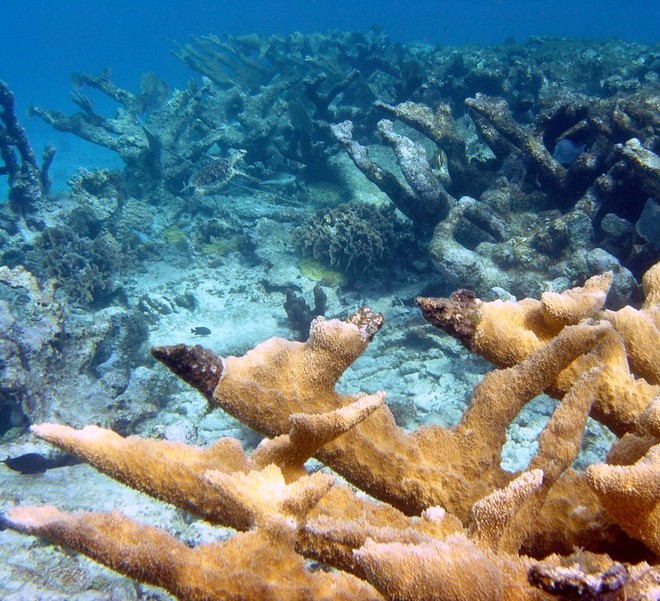Being a bit 'fat' may spell the difference between life and death
by ARC Centre of Excellence for Coral Reef Studies on 15 Mar 2009

The evidence suggests reef systems are becoming more brittle, as a result of bleaching and disease. ARC Centre of Excellence Coral Reef Studies
http://www.coralcoe.org.au/
Being a bit fat may spell the difference between life and death if you’re a coral facing a bleaching crisis.
With the world’s coral reefs facing bleaching almost every year by the middle of the century as the oceans warm, a team of international scientists has revealed for the first time how corals can survive or perish in the face of the climatic onslaught.
An international team led by Dr Ken Anthony of the ACR Centre of Excellence for Coral Reef Studies and The University of Queensland has devised a world-first technique for assessing the chances of corals surviving a bleaching crisis.
Bleaching is caused when warm water circulates over the reef, causing the corals to shed the symbiotic algae they normally rely on for energy. If they cannot recover their algae in time, the corals starve to death.
'It mostly comes down to how well-fed the corals are before the bleaching event strikes,' Dr Anthony says. 'If they have high levels of lipids – or fats – in their system, it gives them the energy to hang on until they can re-establish their symbiotic relationship.'
The new technique offers scientists and reef managers a much clearer understanding of the processes that can lead to high mortality rates among corals affected by bleaching – and also an explanation for why some reefs appear to bounce back quickly, while others never recover.
The main factor is the amount of energy stored as fats in the coral’s tissues, Dr Anthony says. This in turn depends on the level of the food supply in the water prior to the bleaching event, how recently the corals spawned and whether or not there have been other disturbances – such as human activities, storms, low tides and competition from weeds.
After the bleaching event itself, coral survival may also depend on the amount of plankton available in the surrounding water which the corals can subsist on until they can recover their algal partners. 'We believe corals on coastal reefs are generally better able to recover from devastating bleaching event because there is often enough food in the water to keep them going', explains Prof Andrea Grottoli, a coral physiology expert from Ohio State University.
'The research shows clearly that malnourished corals with little or no plankton in the water to rely on have a higher mortality risk – whereas those which are fat before the event and have plenty of food around afterwards have a higher chance of survival', says Dr Mia Hoogenboom – who co-developed the mathematical models.
'Current predictions for global warming indicate that by mid-century ocean temperatures will have risen sufficiently to ensure most of the world’s coral reefs will face the threat of bleaching virtually every year. This tool we have developed helps us to understand much more clearly the chances corals have of surviving such events,' Dr Anthony explains.
'The risk is that annual bleaching will so weaken corals that they will not be able to cope, and will die out completely', says Rachel Middlebrook, a CoE PhD student specializing in coral bleaching stress.
The research also raises interesting questions, like whether there are steps which reef managers or tourism operators may be able to take to protect small areas of reef of particular significance – by providing ‘food aid’ to the local corals before and after bleaching events.
'You’d need to breed large quantities of plankton – as the prawn farming industry already does this. You’d also need to be sure the plankton could be released in a way that would benefit the corals, and the activity would not encourage weed growth.'
However, he adds, this is ‘a bit like rearranging the deckchairs on the Titanic in the hope of preventing the ship from sinking’. The over-riding need is to prevent the climate from warming uncontrollably.
Jeffrey Maynard, a reef ecologist and climate researcher from Melbourne University, said that, fortunately, predictions that 2009 could be a major bleaching year on the Great Barrier Reef never came true as temperatures throughout much of the Marine Park failed to exceed long-term averages for long enough to cause severe bleaching.
The paper describing the research, Energetics approach to predicting mortality risk from environmental stress: a case study of coral bleaching appears in the journal Functional Ecology and was written by Ken Anthony and Rachel Middlebrook (CoECRS and UQ), Mia Hoogenboom (Centre Scientifique de Monaco), Jeffrey Maynard (University of Melbourne) and Andrea Grottoli (Ohio State University).
http://www.coralcoe.org.au
If you want to link to this article then please use this URL: www.sail-world.com/54844